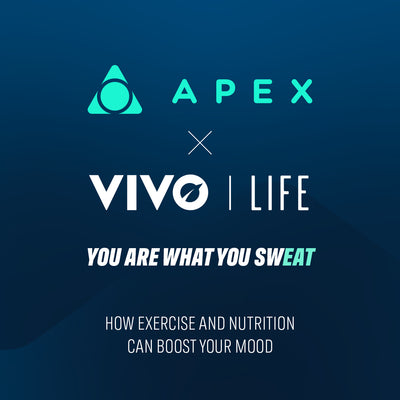
Good Mood Food with Vivo Life
Maddy Slade | 23 May 2022How Food Affects Mood
Here at Apex we know that health goes far beyond just the physical. How you move your body is incredibly important, and pretty much our game, but what you choose to fuel it with is equally crucial.
We're always working to ensure you've got the tools you need to thrive and feel your best. You might be surprised to learn there's a lot of science to back up the links between mood and food. That's why for this year's Mental Health Month we've partnered up with Plant-Based Nutrition Brand Vivo Life.

Vivo Life are all about helping you feel good so you can live life well. They create natural, effective, nutrient dense supplements that help you feel your best, without costing the earth.
We caught up with them to learn a bit more about how food affects your mood, and what we can all do to boost our moods via our nutrition this Mental Health Month.
Read Vivo Life's article on How Food Affects Mood Below:
You are what you eat is a common adage that we’ve probably all heard before. In recent years there has been a huge shift towards promoting whole foods and the benefit of eating a healthy, balanced diet for maintaining your physical wellbeing. But it’s not just your physical health that can suffer as a result of poor nutrition. It can often have a negative effect on mental wellbeing, too.
More and more scientific research is being conducted into developing an understanding of the relationship between your diet and the effect it can have on mental health and wellness. Did you know, for example, that 95% of your body’s serotonin is produced in your gut? This means that having a healthy diet and promoting your digestive health will also help to promote your mental wellbeing overall (Terry and Margolis, 2017).
According to the American Journal of Psychiatry, it is possible for deficiencies and imbalances in our personal nutrition to manifest psychological symptoms, including the onset of depression and dysthymia (a condition classified as mild, persistent depression). For example, deficiencies in minerals such as iron, zinc and selenium are shown to be more prevalent in people with depression, especially during pregnancy when nutritional deficits can occur more readily (Bodnar and Wisner, 2005).
Stressors, for example, can be one of the biggest factors in negatively affecting both our physical and mental health. Studies conducted on university students have shown that there is a relationship between stress, diet and mental health, where the consumption of ‘unhealthy’ foods is linked to higher rates of depression and stress (El Ansari, Adetunji and Oskrochi, 2014).
One way that we can try and ensure a positive outcome for both our physical and mental health is to incorporate a holistic attitude to wellness. A holistic approach recognises that the body works as an interconnected whole, rather than a series of independent organs and therefore takes mental health into account as a factor of physical wellbeing.

When you’re thinking about how fitness supplementation can act in a manner which also helps your mental health, the amount of processing, artificial ingredients and refined sugars which has been used should be considered. Sugar and other processed foods can lead to inflammation throughout the body, which is believed to potentially contribute to feelings of anxiety and depression. (Skilton et al., 2007)

Through a healthy and balanced diet, you can boost your exercise performance and support your mental health at the same time. Being conscious of what you consume, and how it might affect your mental wellbeing, can also impact on your physical activity levels. By consuming products with functional, natural ingredients that are designed to help support your mental health as well as your physical wellbeing, you’ll often find that you feel more energised, less stressed and feel a boost to your cognitive functions.

Take Vivo Life products for example, not only are they high quality, high performance and plant-based, they are packed with natural ingredients, vitamins, minerals and are third-party tested to ensure no heavy metals, pesticides or herbicides. Our best selling PERFORM protein powder not only contains everything you need to boost your fitness performance and recovery, but also contains Reishi Mushroom, which helps to reduce stress and boost your brain function.
Of course, supplements are not designed to replace a healthy balanced diet, good hydration, wellness practices, and being active (whatever that might mean to you). But adding reliable and well-sourced supplements can be convenient, and help you to optimise your mind and body, and reach your goals.

Vivo Life have offered Apex an exclusive 20% discount off your first order. Simply enter the code APEX20 at checkout or follow the link below:
https://www.vivolife.co.uk/discount/APEX20
Sources: